The tragedy of Dodi Fayed, the antihero who died with Lady Di and could not overcome the racism of British high society
The new season of ‘The Crown’ recreates the last days of the couple formed by Diana of Wales and the son of billionaire Mohamed Al-Fayed, a man obsessed with being accepted by the establishment
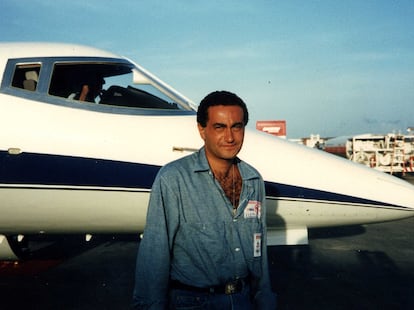
“How is our special guest?” Mohamed Al-Fayed asks his son Dodi over the phone with great interest, referring to Diana of Wales. “She seems happy. Sunbathing on deck,” replies who would be the princess’ last partner. “Good. Now you just have to close her and put a ring on her finger. If you were to marry this girl, overnight you would become a giant. A colossus. You will have money and power beyond your wildest dreams. And you would finally be my equal, because I would make you my partner. In everything.” This dramatized conversation between father and son opens the third episode of the sixth and final season of The Crown. “You’ve never offered that before,” says Dodi, played by Khalid Abdalla, visibly upset. “You never deserved it before!” replies the fictitious version of the Egyptian businessman who became the owner of icons of conspicuous consumption such as the Ritz hotel in Paris and the Harrod’s department store.
Those who knew Mohamed Al-Fayed state that he would never have pushed his son into a marriage, no matter how many advantages he saw in it. What is certain is that Dodi Fayed (whose full name was Emad El-Din Mohamed Abdel Moneim Fayed) was not good enough for business in the eyes of his father. “Mohamed Al-Fayed was a tyrant, a cruel, dominant man that manipulated his family for money,” explains Martín Bianchi, EL PAÍS journalist specialized in lifestyle, society and royalty. “I know, from friends close to the couple, that Dodi was a sensitive man who constantly sought his father’s approval. That’s something he had in common with Diana, who always felt inferior to her sisters and ignored by her father. Their parents’ rejection probably helped them connect.”
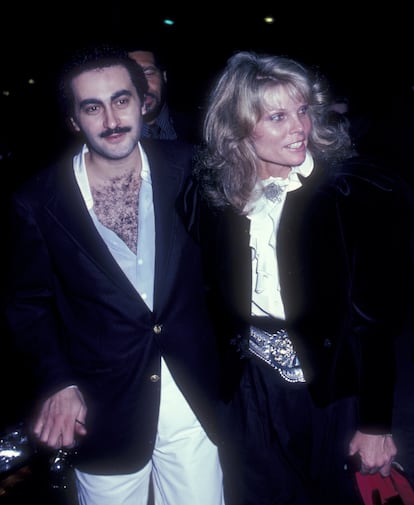
The phone call that we see in the Netflix series took place in August 1997. Just a few weeks earlier, Dodi had been decorating the Malibu house he was moving into with his fiancée, model Kelly Fisher. But for Mohamed Al-Fayed, a marriage with Diana (played by Elizabeth Debicki in the series) would provide a status that he had not been able to achieve despite his fortune. Not for lack of trying: the billionaire moved to England in the 1970s and for more than 25 years was the owner of Harrod’s, the historic department store, suppliers to London’s ruling class. He also took over a soccer team (Fulham FC) and bought the Parisian mansion where the Duke and Duchess of Windsor lived during their exile, as well as a plot of land of almost 30,000 hectares in Scotland.
All this, however, did not change his modest origins or his reality: the businessman was a newly rich Egyptian, and quite delighted to be so, which drove the English high society to snub him as vehemently as he tried to conquer it. In fact, he was never granted English nationality; that is how Dodi, the only son he had with his first wife, Samira Khashoggi — sister of Adnan, the famous arms dealer — possibly became his last hope, a point that The Crown emphasizes.
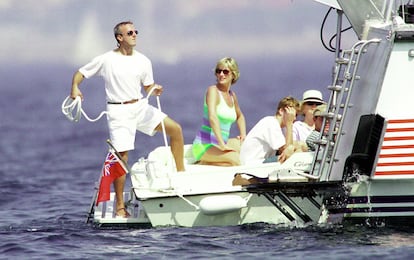
A great opportunity
Ironically, Al Fayed’s first encounter with Diana of Wales took place in the early 1980s during a polo tournament. In the version we see in The Crown, it is precisely the result of an act of snobbishness: the magnate was supposed to seat next to the queen, but she sent Diana so she did not have to watch the event, where Dodi competed against Prince Charles. “Al-Fayed Sr. was fascinated by the British monarchy and by social climbing. He was a businessman that was born in Egypt, a former English colony, who grew up admiring the crown and found in Diana a way to somehow reach it and satisfy his ambition,” explains Bianchi.
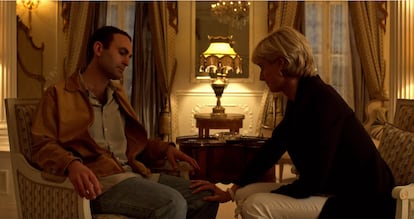
Before becoming the world-famous boyfriend of the recently divorced Lady Di, Dodi produced films in Hollywood, backed by his father’s money. With a salary of $100,000 a month and a personality marked by a solitary childhood surrounded by privilege (he attended the Le Rosey boarding school in Switzerland and was a student at Sandhurst, the military academy to which William and Harry later went), young Al-Fayed had a reputation as a spoiled, womanizing party animal. Insecure, impulsive and generous, he offered very expensive gifts to his friends and his conquests; he loved sports cars but hated speed, and he was passionate about movies, but lacked the persistence to be present every day. As a producer, he won four Oscars with Chariots of Fire (1981); then he participated in the hit F/X (1986) and was one of the executive producers of Hook, a 1991 film directed by Steven Spielberg that was nominated for four Academy Awards that year. It was at the London premiere of Hook, which Diana attended, when Dodi was first dazzled by the princess.
Mohamed always supported him, but when he didn’t like the bills his firstborn son sent him — room service in luxury hotels, or even bills from Harrod’s — he simply refused to pay them. This made Dodi a millionaire playboy for some, and a defaulter for others. It was also Mohamed who invited Diana and her children to spend a few days at the French Riviera, where the romance that ruined his wedding plans with Kelly Fisher was born, as told by The Crown. This is the much-contested fictional version, but, “from what people who knew Diana say, the series does capture their relationship quite faithfully,” says Bianchi.
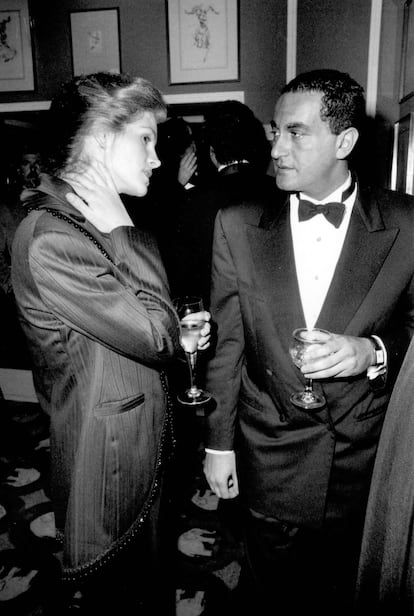
A man in moccasins
When Dodi and Diana started seeing each other, the press went crazy. He liked the attention. However, they had barely had time to get to know each other well when, at the end of that summer, a traffic accident in Paris as the couple was fleeing from the paparazzi at full speed ended the life of the princess and the film producer. Mohamed Al-Fayed maintains that they were engaged, but journalist Tina Brown, the princess’ biographer, has said that “Diana had no intention of marrying Dodi Fayed […] but knew their affair would anger Charles and the rest of the royal family.” Michael Cole, spokesman for the Al-Fayeds, told Vanity Fair that, on the night of their death, the couple had exchanged gifts in their room at the Ritz: for him, cufflinks that had belonged to her father; for her, a spectacular Repossi diamond ring (not very much to Diana’s taste, people close to her would say later).
The day they met their fate, News of the World had stated that the Egyptian was not worthy to marry a member of the British royalty and that Diana’s eldest son, William, did not approve of this relationship either. “Is he still wearing moccasins?” the princess’ firstborn son asks in a scene from the series. Meanwhile, Harry, Diana’s youngest son, refers to Al-Fayed as “the poser,” and both brothers laugh at the fact that the producer is always on the phone with Los Angeles while he is on his gigantic yacht. The situation is, again, dramatized by the Netflix scriptwriters, but it portrays how difficult it was for that foreigner with a taste for open shirts and flashy jackets to fit in among the stiff English aristocracy.
The death of Dodi and Diana once again brought Al-Fayed Sr. into conflict with the British establishment. The Egyptian businessman claimed that the accident had been caused to prevent Diana from marrying a Muslim man. Furthermore, the disappearance of the Princess of Wales caused a worldwide shock and completely overshadowed the fact that two more people had died in that car: Dodi and Henri Paul, the driver. The media mourned the loss of the princess, while the Al-Fayed family — not to mention that of the driver — resigned themselves to mourn in a very discreet background. The patriarch, however, did not give up: the Egyptian turned Harrod’s into a temple for the late couple, complete with memorial monuments.
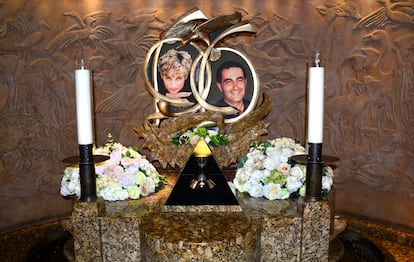
After Dodi’s death, Al-Fayed tried one last time to be granted English nationality, to no avail. In 2003, six years after the fatal accident, he gave up. Mohamed had lost a son and a privileged tax status that allowed him to settle his tax obligations for £240,000 per year. That was his tipping point. He declared that the British upper classes were inherently racist and, after 35 years on English soil, announced that he was moving to Switzerland. In 2010, he sold Harrod’s to the royal family of Qatar and in 2013 he got rid of Fulham FC. On August 30, 2023, one day before the 26th anniversary of Dodi’s death, Mohamed died at the age of 94. It was the end of a man whose ego was even larger than his possessions. Someone who once told the Financial Times that, when he died, he wanted his body to be displayed at Harrod’s so that people could visit him. That wish was not granted either.
Sign up for our weekly newsletter to get more English-language news coverage from EL PAÍS USA Edition
Tu suscripción se está usando en otro dispositivo
¿Quieres añadir otro usuario a tu suscripción?
Si continúas leyendo en este dispositivo, no se podrá leer en el otro.
FlechaTu suscripción se está usando en otro dispositivo y solo puedes acceder a EL PAÍS desde un dispositivo a la vez.
Si quieres compartir tu cuenta, cambia tu suscripción a la modalidad Premium, así podrás añadir otro usuario. Cada uno accederá con su propia cuenta de email, lo que os permitirá personalizar vuestra experiencia en EL PAÍS.
¿Tienes una suscripción de empresa? Accede aquí para contratar más cuentas.
En el caso de no saber quién está usando tu cuenta, te recomendamos cambiar tu contraseña aquí.
Si decides continuar compartiendo tu cuenta, este mensaje se mostrará en tu dispositivo y en el de la otra persona que está usando tu cuenta de forma indefinida, afectando a tu experiencia de lectura. Puedes consultar aquí los términos y condiciones de la suscripción digital.









































